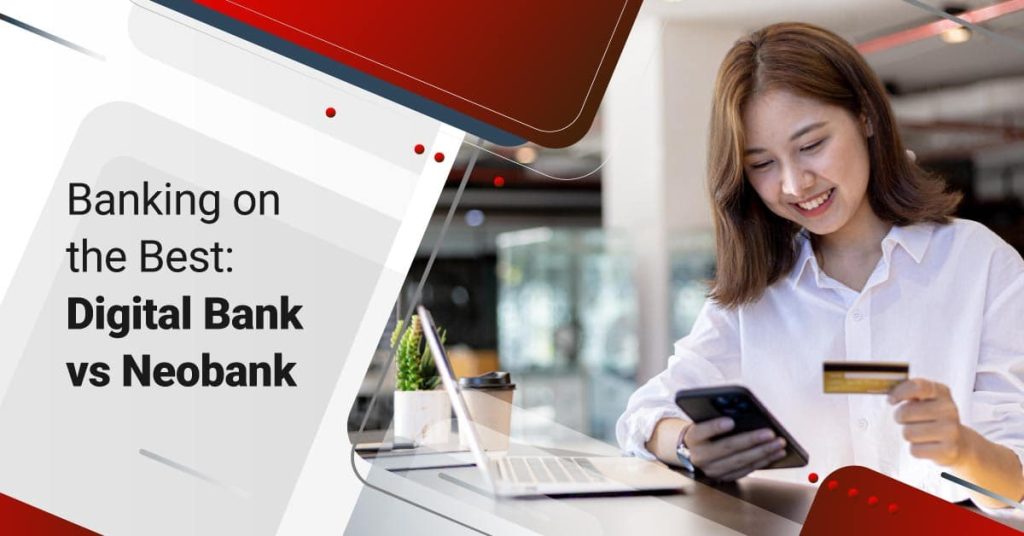 In an age defined by digital transformation, banking has not been left behind. That means Singapore businesses looking to open a corporate bank account now have a choice.
In an age defined by digital transformation, banking has not been left behind. That means Singapore businesses looking to open a corporate bank account now have a choice.
They can choose between sticking with traditional banking systems, transitioning to new digital banks, or even embracing the innovative offerings of neobanks.
This article aims to explore the differences between digital banks and neobanks, providing an in-depth review of their unique benefits and potential drawbacks.
We will compare offerings in Singapore’s progressive banking sector, and ultimately guide corporate clients to the most suitable banking type for their needs.
Understanding the Digital Bank
A digital bank is essentially a traditional bank’s counterpart that operates primarily through online channels. It might be completely or partially digital, depending on the bank’s specific business model.
A fully digital bank, for example, would conduct all its operations online, offering customers 24/7 access to digital banking services via mobile applications or websites.
In practice, it is not a massive departure from traditional brick and mortar banking operations, only that it offers digital services for extra convenience.
In Singapore, the Monetary Authority of Singapore (MAS) has been proactive in the digital banking space, with allowances for Digital Full Bank (DFB) licenses and Digital Wholesale Bank (DWB) licenses.
While DFBs serve retail clients and offer a full range of banking services, DWBs are geared towards small and medium enterprises (SMEs) and other non-retail customers.
Notable examples of digital banks in Singapore include Grab and Singtel’s GXS Bank, Sea Limited’s SeaMoney, NTUC and Standard Chartered’s Trust Bank, Ant Group-backed Anext Bank, and Green Link Digital Bank backed by Greenland Financial Holdings.
Related Read: Putting Consumers at the Heart of Fintech Innovation »
Unpacking the Neobank Phenomenon
A neobank, on the other hand, is a new breed of financial technology (fintech) company that solely provides online and mobile banking services.
Unlike digital banks, they operate without any traditional banking licenses but work in partnership with traditional banks for the safekeeping of customer funds, per the MAS’s requirements.
Neobanks typically target niche markets and provide specialised financial tools and applications designed to simplify online banking.
They usually focus on delivering exceptional customer experience (CX) through dynamic, innovative solutions, often at more affordable rates than traditional banks.
In the Singaporean context, neobanks such as Wise (formerly Transferwise), Aspire, and YouTrip have made significant strides in the banking industry.
Related Read: Banking on the Future: Why Are Neobanks in Singapore on the Rise?
Comparing Digital Banks and Neobanks: A Closer Look
There are significant differences between digital banks and neobanks, even though they both operate primarily online.
Digital banks offer a comprehensive range of banking services much like traditional banks, albeit through digital channels. They are regulated and licensed by the MAS, providing customers with the confidence that they are dealing with a secure and controlled banking entity.
Neobanks, however, are more flexible and agile due to their lean business models. They provide specialised services and are known for their innovative financial tools, exceptional user experience and affordability.
The downside is that they operate without a banking license, which might cause some concerns for prospective clients despite the regulation in place requiring partnerships with traditional banks for fund safekeeping.
| Comparison Factor | Digital Banks | Neobanks |
| Licensing and Regulation | Digital banks are licensed and regulated by the MAS, providing assurance about the safety of your business’s funds. | Neobanks operate without a bank license. They collaborate with licensed banks for the safekeeping of customer funds, ensuring regulatory com |
| Range of Services | Digital banks offer a comprehensive range of banking services, similar to traditional banks. These can include business loans, corporate credit cards, cash management services, trade finance, and more. | Neobanks typically offer a more specialised range of services targeting specific business needs. This might include integrated accounting, invoicing and payment solutions, expense management tools, and more. |
| Availability and Accessibility | Digital banks provide 24/7 access to services via their mobile applications or websites. Many also offer customer support around the clock. | Neobanks also offer round-the-clock access to their services via their app or website. Their focus on superior customer experience often translates into intuitive user interfaces and seamless transactions. |
| Customer Experience | While digital banks aim to provide a satisfactory customer experience, their focus is often spread across a broad range of services and customer segments. | Neobanks, with their lean business models and niche focus, typically emphasise superior customer experience. They often leverage AI and advanced analytics to personalise and simplify the user experience. |
| Cost Efficiency | Digital banks can be cost-effective compared to traditional banks due to lower operational costs. They may offer competitive rates and fees for their services. | Neobanks, without the need for physical infrastructure and with a focus on technology, can often provide services at a lower cost than traditional and digital banks. They may also provide more transparency about fees and charges. |
| Innovation | Digital banks, while innovative in their online approach, might still be bound by some traditional banking practices and regulations. Their ability to innovate and adapt could be slower than neobanks. | Neobanks are at the forefront of financial innovation. They are typically more agile and quicker to adapt to changes and improvements in technology, providing businesses with up-to-date, tech-forward solutions. |
Remember, each business is unique and has its own specific banking needs. This table serves as a general guide, but businesses should conduct their own due diligence to choose a bank that best fits their needs.
Making the Choice: Digital Bank or Neobank?
For companies seeking to open a business bank account, the choice between a digital bank and a neobank depends on their specific needs.
Digital banks, with their comprehensive range of services, could be more suitable for businesses that require a wide variety of banking services. They also offer an ideal solution for companies needing to manage complex financial activities.
Neobanks could be a better choice for businesses seeking innovative, simplified solutions. If your company values agility, superior customer experience, and affordability, a neobank might be the perfect fit.
Listen to Podcast: Episode 3: FinTech »
What’s Next for Your Corporate Banking Needs?
In the ever-evolving corporate banking landscape, digital banks and neobanks offer compelling alternatives to traditional banking with their optimised digital services and cost-effectiveness.
Choosing the right banking solution, be it a digital bank, a neobank, or a traditional bank, significantly impacts your business’s functionality and financial health.
Understanding the unique needs of your business and the capabilities of various banking options is crucial. This requires careful consideration of factors such as service range, cost efficiency, customer experience, accessibility, and security and regulation.
Remember, you are not alone in this complex decision-making process. Our team at InCorp is ready to assist, providing insights and guidance to find the perfect fit for your business.
If you need help finding the ideal banking or finance solution for your enterprise, get in touch with us. At InCorp, we are about building long-lasting business relationships that empower your business’s growth and success.
Contact us today. Let us journey together towards a future of financial stability and success for your enterprise.
Contact our team
Posts not found!
FAQs
What is the difference between digital banks and neobanks?
- Digital banks are essentially traditional banks that have transformed their services to a digital format. They often still maintain physical branches and are bound by the same regulatory measures as traditional banks. Neobanks, however, are entirely digital and do not have any physical branches. They offer banking services through their mobile app or online platforms.
Which is better for businesses - a digital bank or a neobank?
- Whether a digital bank or a neobank is better for your business depends on your specific needs. Neobanks may offer more flexibility and cost-effectiveness, especially for small businesses or start-ups. Meanwhile, digital banks might provide a wider range of services and enhanced security, essential for larger corporations.
Are digital banks and neobanks safe for businesses?
- Digital banks and neobanks take extensive measures to ensure the safety and security of your business’s financial data. They use encryption, two-factor authentication, and other advanced security features. However, the level of protection can vary from bank to bank, so it's essential to thoroughly research your chosen provider.
What are the main advantages of digital banks and neobanks for businesses?
Digital banks and neobanks offer numerous advantages for businesses, such as:
- 24/7 access to banking services
- Lower fees
- Real-time transaction visibility
- seamless integrations with other business software
They can provide improved efficiency and cost-effectiveness compared to traditional banking.


